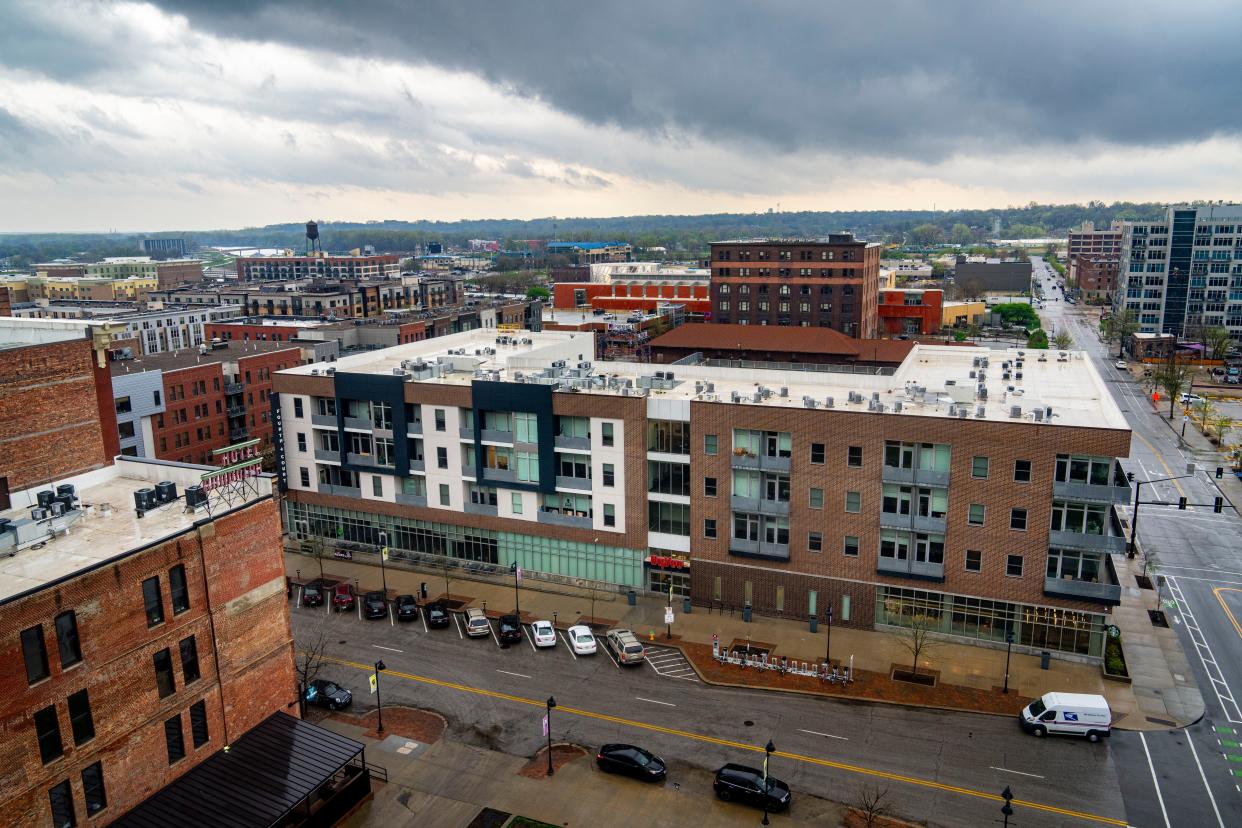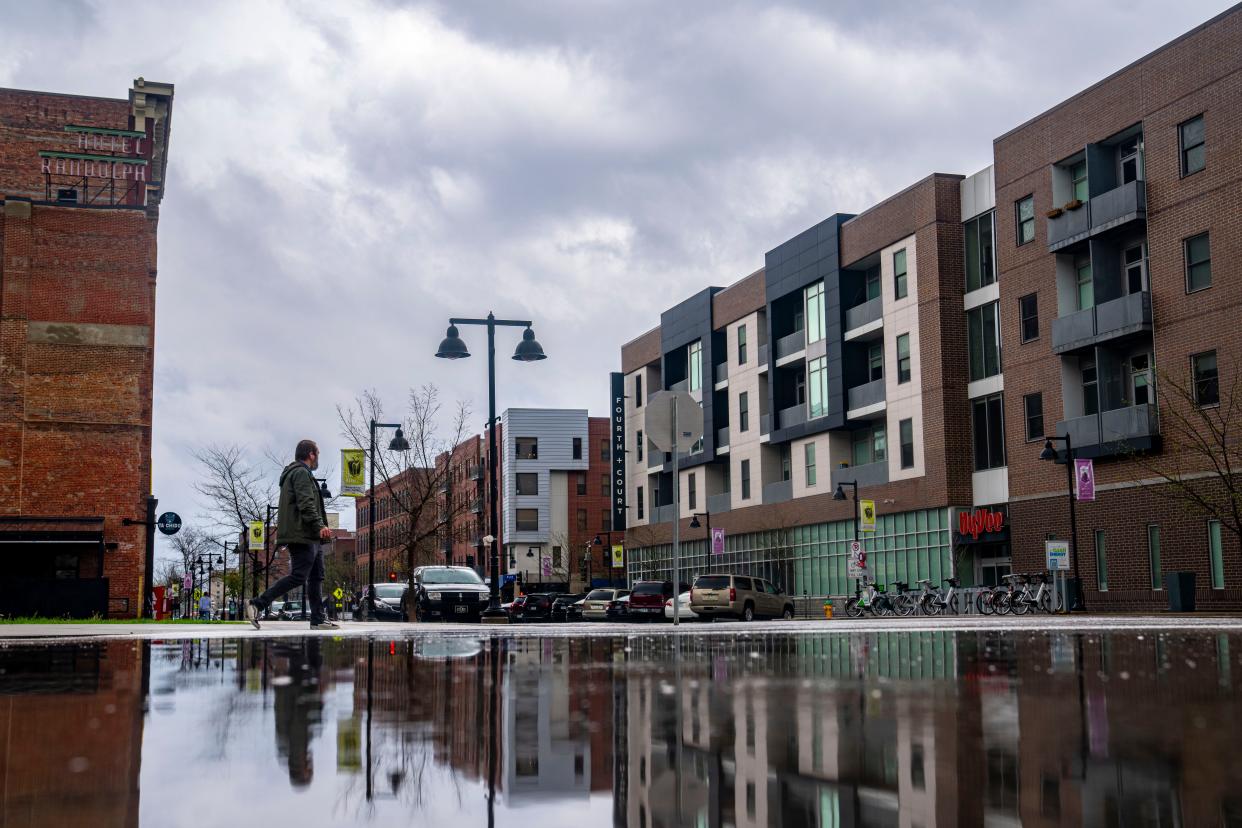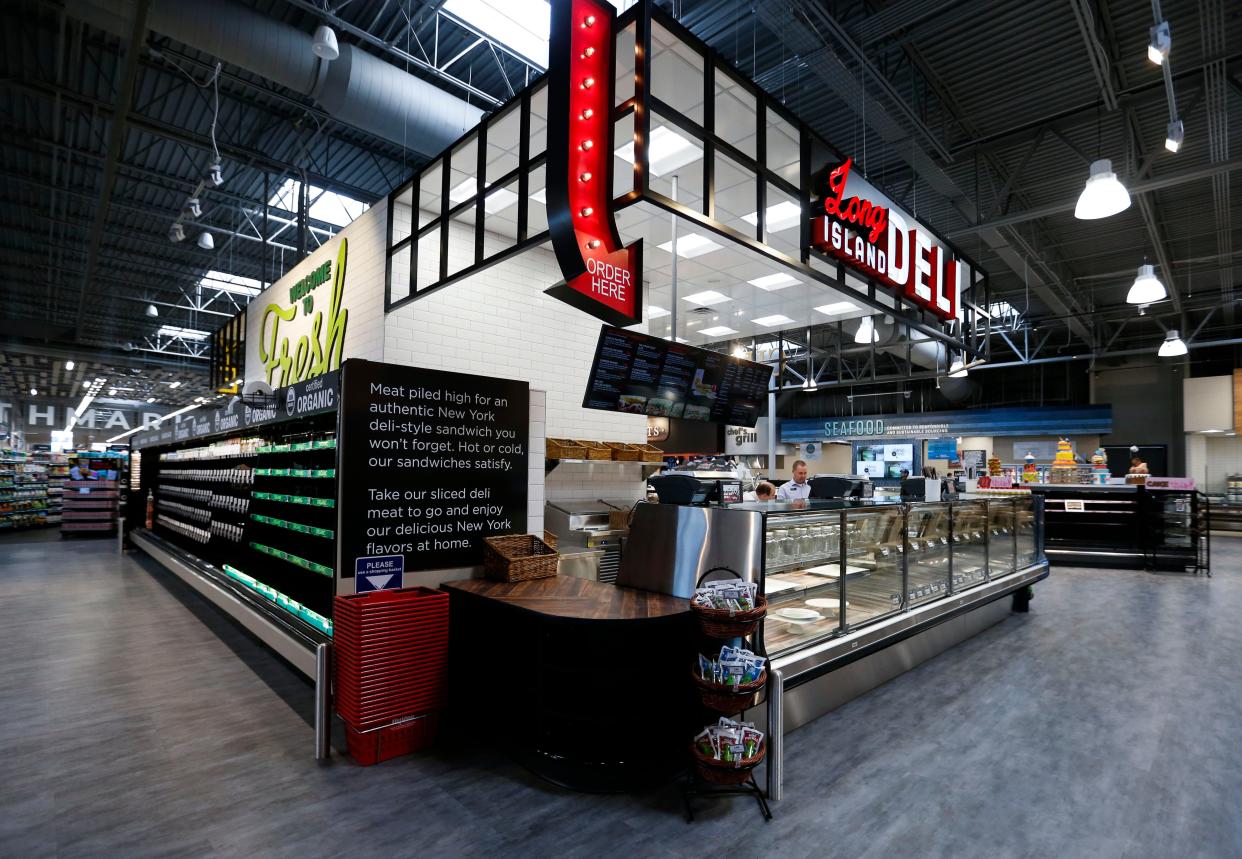After downtown store hours slashed, are Hy-Vee, Des Moines City Council near a resolution?

Hy-Vee and Des Moines could be close to reaching a resolution after the supermarket chain, violating the terms of a 2015 development agreement, drastically reduced the hours of the Court Avenue store, the only supermarket serving downtown Des Moines' growing population.
Hy-Vee on Feb. 5 abruptly cut the store's hours by a third, to 8 a.m. to 6 p.m. from 6 a.m. to 9 p.m. The move came without advance notice to the city government or public despite the development agreement's stipulations.
Amid an ensuring uproar, the store's hours changed again a short time later ― and again without announcement ― to 7 a.m. to 7 p.m. Those hours, now officially posted on the store's doors and website, have remained in place while city and Hy-Vee officials engaged in talks.
Discussions between the West Des Moines-based company and city officials continue, city spokesperson Debbie McClung said Friday. But, a resolution could be reached in time for the council to consider it at its May 6 meeting, said Ward 3 council member Josh Mandelbaum, whose district includes downtown.
Hy-Vee spokesperson Tina Potthoff confirmed the city and company were close to reaching an agreement, but that it is still being finalized before being presented to the council.
"We've been meeting with the city for the past several weeks," Potthoff said. "A resolution will be announced in the next several weeks."
According to a person with knowledge of the discussions, the hours could be similar to the current ones.
The store opened in 2017 with hours of 5 a.m. to 11 p.m. That was even longer than the 6 a.m. to 11 p.m. required by the development agreement, which gave an LLC owned by Hy-Vee and West Des Moines developer Knapp Properties the city-owned land at a large discount so long as the multiuse building Knapp planned to build there included the supermarket.
During the pandemic shutdowns in 2020, when retailers of all sorts were struggling, Hy-Vee dropped the hours with city permission to 6 a.m. to 9 p.m., the schedule it maintained before February's change.
Construction of the store fulfilled a four-decade-long goal of the city, which wanted a grocery story to serve residents in the city's core. From 2010 to 2020, downtown's population grew by 82% to 8,371, the U.S. Census showed. Mandelbaum said in March that it could now be as high as 15,000 to 18,000.
February's big cut in hours left residents wondering if Hy-Vee, the Des Moines metro's largest employer, was on the way to closing the store. Analysts and residents speculated that the location is not profitable or as profitable as Hy-Vee would like. Downtown Neighborhood Association President Brandon Brown described it as a possible "loss leader" for the chain.
"It definitely, to me, telegraphs volatility,” said Brown.
Potthoff declined to comment on the store's profitability. She said that declining foot traffic since the onset of the COVID-19 pandemic and increasing theft and disruptive behavior in the store made the changes necessary.
Whatever the reason, 2024 has so far been a rough patch for the central business district's limited retail sector. In February, Walgreen's, which operated downtown locations for more than a century, closed its store at 666 Walnut St. The following month, Kum & Go closed the experimental walk-up store at 319 Seventh St. it had opened in 2020.
The closures come as major employers, especially Wells Fargo and Nationwide Mutual Insurance, have reduced their downtown office space. The operators of the Financial Center and Two Ruan Center both have announced in recent months they are converting part or all of the downtown office towers to residential use.
Aaron Hyde and Justin Lossner, retail industry analysts with JLL Brokerage at 801 Grand Ave., said Hy-Vee is trying to navigate changes to foot traffic as downtown enters a "transition" after the pandemic. Hyde said he doubted the store will close anytime soon.
"Sometimes things get taken apart and put back together," Hyde said. "I think Hy-Vee came in to show their commitment to this town. So I think they’re committed."
'You need to have access to food.'
The quest for a major downtown grocery store began in the mid-to-late 1980s as residents began to moving to new apartments downtown. Nightlife sprang up in the East Village, on Court Avenue and elsewhere downtown, helping the city shed its nickname, "Dead Moines."
"You should be able to live downtown, work downtown and play downtown, and not have to get into a vehicle to do anything else," Brown said. "But in order to do that, you need to have access to food."
Various grocery store ventures came and went until, in 2014, Knapp Properties and Hy-Vee surprised city leaders by proposing to build an 81-unit apartment building with a ground-floor supermarket on a city-owned parking lot at 420 Court Ave. At 36,000 square feet, the store was smaller than Hy-Vee's suburban locations, though larger than most of competitor Fareway's newer stores, which tend to be about 24,000 square feet.
The development agreement between Hy-Vee, Knapp Properties and the city took effect in 2017. 420 Court Avenue LLC, formed by Hy-Vee and Knapp Properties in 2015 when the agreement was finalized, owns the building, according to the agreement and the Polk County Assessor's Office.
The companies acquired the land from the city for $3.57 million with a rebate of $3.3 million, paid by the city over 10 years, if they met certain requirements in the agreement. Then, in years 10 through 15, beginning in 2027, the companies will receive a portion of the new property tax revenues the building generates.
Potthoff said she understands the store is critical to residents and that Hy-Vee remains committed to the store.
"We want to provide a service to the downtown community," Potthoff said.
Phil Lempert, a Santa Monica, California-based grocery analyst who toured the store in 2017 with then Hy-Vee CEO Randy Edeker, said that when it opened it appeared as though it would be successful, given the high number of office workers and the growing residential population in the area. But with the finance industry in downtown Des Moines contracting and more people working from home, the store needs to "evolve," Lempert said.
"That means cutting hours. It means closing stores. It means going where the people want you to be in order to buy their food," Lempert said. "It’s a sheer numbers game. You got to have enough people going into a store to make it profitable to turn over the merchandise and frankly to get the employees excited."
But even with the growing population, Orchestrate Hospitality President Paul Rottenberg, whose restaurant group operates Sherman Hill's Gateway Market, said he never thought there were enough residents in that area to support the store.
"I think that was a mistake," Rottenberg said, adding that the plan was not "well thought out."
"The downtown market wasn’t at a point yet where you could be predominately a pedestrian grocery of that size," he said, adding that he believes the city was "too far ahead of our skis."

Residents want a downtown grocer, but will not shop there consistently enough to support one, said Andy Massoth, a co-owner of restaurant chain Full Court Press, whose holdings include downtown staples El Bait Shop, Fong's Pizza and the Royal Mile pub.
Massoth ran Full Court Press' attempt at a downtown grocery store, River Bend Trading Co. at 208 Court Ave., from its July 2007 opening to its January 2008 closing.
"They want it, but they’re not going to support it enough to make it stick," he said of downtown residents.
'Nothing traditional about it'
Hy-Vee has long experimented at its Des Moines metro-area stores before rolling concepts out to other areas. In the early 2000s the chain sold men's dress clothes at two West Des Moines stores, before quickly scuttling the project when it failed to catch on. The Court Avenue store was a similar experiment ― Hy-Vee's first urban concept.
It offered not just an array of grocery items, but fresh food and ready-to-eat meals as well as a sit-down Market Grille restaurant with a full bar, now operated under the Wahlburger brand.

"There (is) nothing traditional about it. You're not going to walk in and say 'grocery store,'" Edeker said as the store opened. "This is about food and about the lifestyle of today."
Plans to change downtown store stall
But even as ideas pioneered in the downtown store became major elements of a new generation of Hy-Vee superstores, seen locally at the Grimes store that opened in 2021, the company showed signs it was having second thoughts about the Court Avenue location.
The same year, it announced plans to turn the store into a standalone "Hy-Chi" restaurant and a HealthMarket selling supplements and organic produce. Residents and city officials wondered if the conversion would change the store's identity from the full-service grocery store required by the development agreement. The changes were never made and last year Hy-Vee said they were on hold.
Even if the store is not profitable, it gives Hy-Vee a place to experiment, Lempert said.
"I think there are a lot of learnings there that have been brought into other Hy-Vee stores in the suburbs, and that’s OK," Lempert said. "There’s always value in having a store with a population that’s younger, that’s more vibrant, where you can experiment with things and test things and being able to bring it into other stores."
What is the future of the store?

With the February change in hours, Des Moines could have invoked a clause in the development agreement that would have given Hy-Vee 45 days to "cure or remedy such default," or face suit for breach of contract.
Instead, Mandelbaum in interviews in March and April stressed that the city wants the store to be successful, though he cautioned that whatever proposal comes to the council, it must include hours that allow people to "get there after work," and include "product offerings that you would expect in a full-service grocery store."
He stressed that maintaining the store is essential to downtown's continued residential growth.
"Downtown is not just a business district. It’s not just a cultural center," Mandelbaum said. "It’s also a neighborhood. That means that you need the full range of amenities that people expect in a neighborhood. That includes retail options. That includes being able to get many of the things that you need for daily living."
Residents will be sure to weigh in on whatever adjusted operating hours are proposed, Brown said.
"If something happens that the residents don’t like, they’re going to hear about it," he said. "This is a pretty large voting population and it impacts a lot of different members of council."
Staff writers Addison Lathers and Virginia Barreda contributed to this article.
Philip Joens covers retail, real estate and RAGBRAI for the Des Moines Register. He can be reached at 515-284-8184, pjoens@registermedia.com or on Twitter @Philip_Joens.
This article originally appeared on Des Moines Register: Des Moines council prepares to resolve downtown Hy-Vee hours diispute
